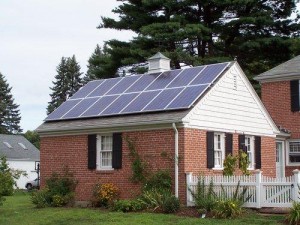Energy Efficiency
Solar energy is bipartisan and recent surveys have shown that the American voter is in favor working towards a solar future.
Solar energy is bipartisan and recent surveys have shown that the American voter is in favor working towards a solar future.
There isn’t a single issue on which Democrats, Republicans and those in between can agree – right? Despite how it might seem out on the campaign trail and in the endless negative ads flooding our TV screens (except, for some reason, those of us in northern California), nothing could be further from the truth.
One very important case in point is solar power. A recent survey conducted by the independent polling firm Hart Research Associates determined that more than 9 out of 10 Americans – 92 percent – think the U.S. government should do more to support, develop and use solar energy.
What may be startling to our political leaders – especially those that try to use renewable energy as a “wedge” issue to attack their opponents – is the clear bipartisan agreement on the value and importance of solar for the country.
 In the survey conducted September 4 to 9, 1,206 American voters were interviewed including Republicans, Democrats, and those defined as independent voters (ticket splitters and voters who frequently vote for candidates from both parties). With a margin of error of +/- 2.8 percent, 84 percent of Republicans, 95 percent of independents, and 98 percent of Democrats all expressed support for solar energy and felt the government should do more to expand its use and development.
In the survey conducted September 4 to 9, 1,206 American voters were interviewed including Republicans, Democrats, and those defined as independent voters (ticket splitters and voters who frequently vote for candidates from both parties). With a margin of error of +/- 2.8 percent, 84 percent of Republicans, 95 percent of independents, and 98 percent of Democrats all expressed support for solar energy and felt the government should do more to expand its use and development.
“American voters have spoken loud and clear – they love solar and they want more of it. Republicans, independents, and Democrats are unified in calling on Congress to increase our use of solar energy in America,” said Rhone Resch, president and CEO of the Solar Energy Industries Association
Helping to break away from the “Solyndra narrative” promoted by polarized leaders in Washington, almost four out of five voters, 78 percent, want government to support solar development through tax credits and financial incentives. Two-thirds of swing voters, 67 percent, put solar energy development at the top of the list for energy sources that should receive government support through such measures.
“These results clearly show that American voters across the political spectrum have a strong favorable view of solar energy and the solar industry, and they believe that government has an important role to play in allowing this industry to grow and succeed,” said Geoff Garin, president of Hart Research Associates.
Solar appeals to a wide political spectrum because it represents at least some values that are important everyone:
But there are concerns about solar as well:
The good news, I believe, with the negative views as that they come from either a lack of knowledge (or misinformation) about solar energy (too expensive, wasteful spending, not practical) or those concerns are being addressed through innovation and technical development (efficiency, reliability).
What is clear is that, despite the gridlock in Washington and the heated rhetoric out on the campaign trail, Americans are ready for solar and they want the government to step up and do its part to support it.